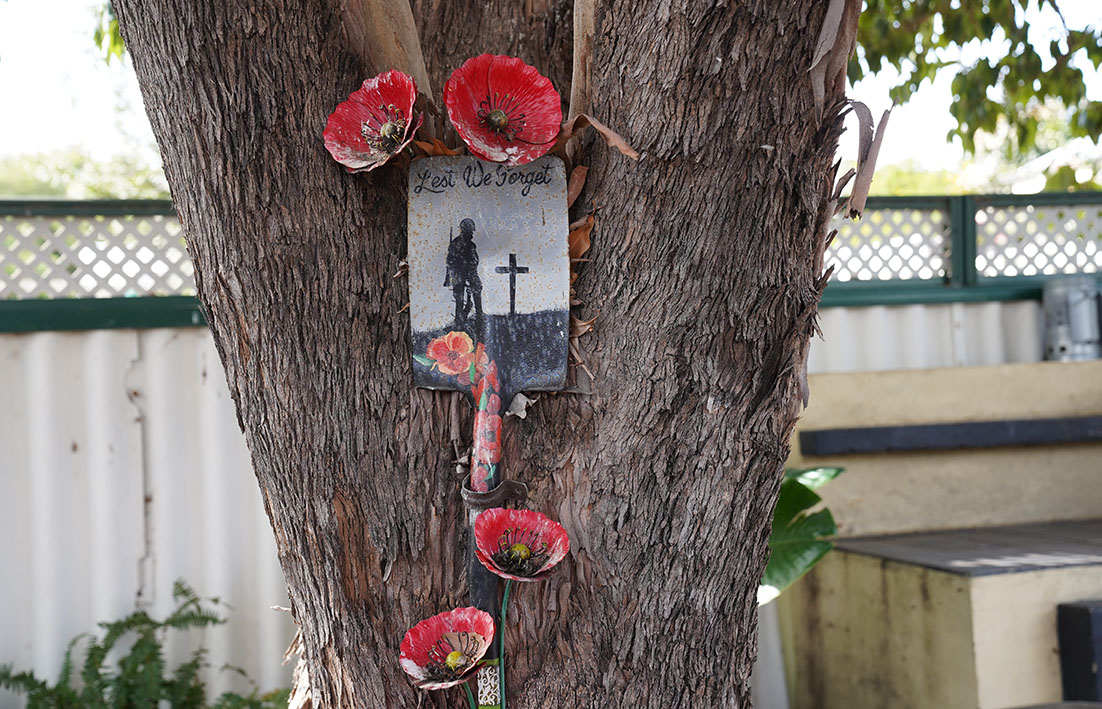
NUMBER 24 Johnson Street appears at first glance to be a period shop and home, but here, as with many homes around Guildford there is a tale to be told, a tragic tale of a family affected by the events of World War I.
The Roach family had two sons who enlisted in the armed services in 1914.
The young men, along with their peers, eagerly stepped forward to sign up their names and their future with the Australian Imperial Forces (AIF).
They were both high achievers and excelled in athletic activities.
They were both imbibed with a strong sense of community and duty, instilled in them by their father who worked for many years as a Guildford councillor and organised sporting activities for young people.
Only one son returned at the end of the war in 1919.
Wallie Passmore Roach enlisted on August 15, 1914 just before his 22nd birthday, at Blackboy Hill, Greenmount.
He had a previous record of outstanding athletic achievement, winning many cricket and cycling events and medals.
A Guildford Volunteer Fire Brigade (GVFB) member he had won medals for his team in state competitions.
Wallie joined the 6 Platoon, C Company 11th Battalion 3rd Brigade Australian infantry forces with a regimental number of 348.
After a brief period of training he embarked on November 2, 1914 on HMAT Ascanius A11 for Alexandria with the first contingent of West Australians.
The battalion entrained for Mena Camp adjacent to the great Pyramids.
Here they trained for four months at Mena Camp before embarking on HMAT Suffolk for Lemnos with the MEF.
On the April 24, 1915, the 11th Battalion sailed from Lemnos for the dawn landing at Gallipoli.
In the confusion of the landing and ensuing battles of April 25, little is known about the events that lead to the loss of Wallie at the landing at Anzac Cove or in the ensuing battles.
By the evening of April 25 more than 2000 of the 16,000 AIF men who had landed at Anzac Cove had been killed or wounded.
The first the people of Perth heard of the April action at Gallipoli was in May 1 newspapers.
The government determined that no casualty lists would be released until families had been informed.
The Roach family received a telegram on June 14 advising that their son Wallie was reported as missing.
They anxiously wrote to the Defence Department stating they had been privately informed that he was wounded and asked for urgent follow up.
Wallie’s sister followed up writing to the Defence Department in August 1916 asking if any more information about her brother had been received.
At this point her correspondence indicated a belief he may be missing and dead.
A Court of Inquiry met in France to consider the details of missing AIF soldiers and with no record of Wallie’s survival, they determined that he died in action on or about April 25, 1915.
No personal effects of Pte Wallie Roach were found that could be returned to the family.
No body was located for a marked grave but his name is recorded on the WA State War Memorial, the Guildford Town War Memorial, the Guildford Primary School War Honour
Board, the St Matthew’s Church Honour Boards and the GVFB honour board.
Wallie’s father wrote to the Defence Department asking for Wallie’s service medals.
He was entitled to the 1914-15 Star, British War Medal and the Victory Medal.
In addition the family received a memorial plaque.
In 1916, after Wallie Roach was deemed missing, his younger brother, Earl Worth Roach decided to enlist as a gunner with the artillery.
His parents both signed his enlistment papers, although it must have been a heart breaking decision to support him.
Earl had previously trained with the 38th Battery based in Guildford.
He was 19-years-old when he enlisted and was transferred to Marybinong in Victoria for further training.
On November 23, 1916 he embarked on the Hororata for Plymouth arriving on January 29, 1917.
Earl then moved with his regiment to Larkhill and then proceeded to France in July 1917.
Earl served on the Western Front with the 10th and 13th Field Artillery Brigade until the Armistice in November 1918.
He then completed further training before returning to Australia on the Konigin Louise on August 2, 1919.
Earl was awarded the British War Medal and the Victory Medal for his service.